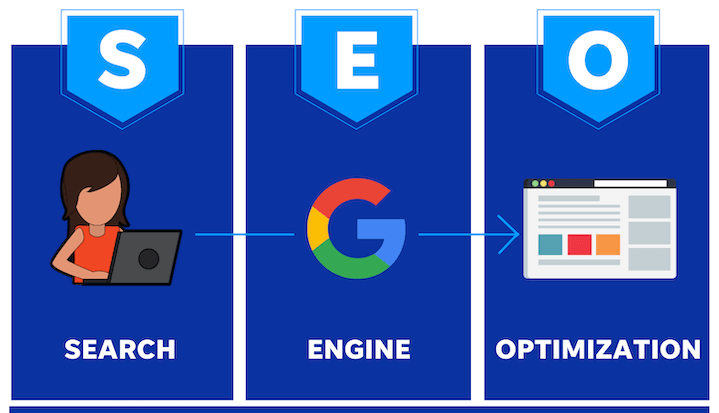Are you struggling to get your website noticed by search engines? Search engine optimization (SEO) is essential for improving your website’s visibility and driving traffic to your site.
What is SEO?
[sp_comments_block]
SEO stands for “Search Engine Optimization. It is the process of optimizing a website to increase its visibility and ranking in search engine results pages (SERPs) for relevant search queries.
It involves optimizing a website’s content, structure, and other elements to make it more attractive to search engines and improve its relevance and authority in relation to specific keywords or topics.
The ultimate goal of SEO is to drive organic traffic to a website, increase its visibility, and ultimately generate leads, sales, or other desired outcomes.
To optimize means to make something as effective, efficient, or perfect as possible. In the context of SEO, optimizing a website means making changes to its content, structure, or other elements to improve its visibility and relevance in search engine results pages (SERPs).
This may involve making changes to the website’s HTML code, creating high-quality content, building backlinks from other websites, improving website speed and performance, and using other strategies to improve the website’s SEO ranking. The goal of optimization is to improve the website’s visibility and attract more organic traffic, ultimately leading to increased leads, sales, or other desired outcomes.
In this blog post, we’ll discuss strategies for improving your website’s SEO ranking.
Strategies for improving your website’s SEO ranking.

1. Perform Keyword Research for SEO:
If you want to improve your site’s visibility with SEO, one of the most critical steps you need to take is keyword research.
Keyword research helps you identify the terms and phrases people use when searching for information related to your business. Armed with this information, you can create content that aligns with the search intent and increases the chances of ranking higher in search results.
Here are the steps to perform keyword research:
- Start with a seed list: Begin by brainstorming a list of topics related to your business. These topics should reflect what your audience is interested in, and they should be broad enough to generate a range of related keywords. For example, if you run a digital marketing agency, your seed list could include topics like social media marketing, SEO, PPC advertising, and email marketing.
- Use a keyword research tool: Once you have your seed list, you can use a keyword research tool like Google Keyword Planner, Ahrefs, or SEMrush to generate a list of related keywords. These tools provide you with data on search volume, competition, and other important metrics. Use these metrics to identify high-potential keywords that are relevant to your business and have a good balance of search volume and competition.
- Analyze your competitors: Your competitors can be a rich source of keyword ideas. Analyze their content and identify the keywords they are targeting. You can use tools like Ahrefs or SEMrush to see what keywords your competitors are ranking for and the pages that are driving the most traffic to their site.
- Consider long-tail keywords: Long-tail keywords are phrases that contain three or more words. They are usually more specific and less competitive than short-tail keywords. Including long-tail keywords in your content can help you rank for niche queries and increase the relevance of your content.
- Group your keywords: Once you have a list of keywords, group them into related topics. This helps you create content clusters around specific topics, making it easier for search engines to understand the structure of your site.
Keyword research is an essential part of any SEO strategy. By understanding the terms and phrases people use when searching for information related to your business, you can create content that aligns with search intent and improves your site’s visibility. Use a mix of keyword research tools, competitor analysis, and long-tail keywords to generate a list of relevant keywords and group them into related topics.
2. Optimize Your Content:

Optimizing your content for search engines is a crucial SEO strategy to increase your site’s visibility on google and attract more traffic to your website.
What does it mean to optimize content?
Optimizing content means making it more visible and appealing to search engines and users. Search engines use complex algorithms to determine the relevance and quality of content, and optimizing your content helps ensure that it is presented favorably to these algorithms.
When you optimize your content, you are making sure it is structured and written in a way that search engines can easily crawl and understand. This includes using relevant keywords and phrases in your content and meta data, providing clear and concise headings and subheadings, and linking to other relevant content on your site.
Here are some tips to help you optimize your content for search engines:
- Research keywords: Start by researching keywords that are relevant to your business or topic. Use keyword research tools to find the most popular keywords that your target audience is searching for.
- Use keywords strategically: Once you have identified your target keywords, use them strategically in your content. Use the keywords in your page titles, headlines, meta descriptions, and throughout your content.
- Write quality content: Make sure your content is high-quality, informative, and engaging. Search engines reward sites that provide value to their users, so focus on creating content that will be useful to your target audience.
- Optimize your meta data: The meta data on your website, including the title tags and meta descriptions, should include your target keywords and provide an accurate description of the content on the page.
- Use header tags: Use header tags (H1, H2, H3) to structure your content and make it easier for search engines to understand the hierarchy of your content.
- Optimize your images: Make sure to optimize your images by using descriptive filenames and alt tags that include your target keywords.
- Use internal linking: Use internal linking to link to other relevant content on your website. This helps search engines understand the structure of your site and can also keep users engaged on your site for longer.
By following these tips, you can optimize your content for search engines and improve your online visibility.
3. Improve Your Website’s Speed for SEO:

In today’s fast-paced digital age, website speed has become a critical factor in both user experience and search engine rankings. Slow loading pages can lead to frustrated users, high bounce rates, and ultimately lower search engine rankings. If you want to improve your website’s speed for SEO, here are some tips to help you get started.
- Optimize your images: Images are often the largest files on a website, and they can significantly impact your website’s speed. Compressing images to reduce their file size can improve load times without sacrificing image quality. Using relevant alt text for images can also help search engines understand the content of the images on your website.
- Minimize HTTP requests: Each element on your website requires an HTTP request, which can slow down your website’s load time. To minimize the number of HTTP requests, combine multiple scripts into one file and use CSS sprites to combine multiple images into a single file. To learn how to do this on WordPress, you can get our SEO course.
- Use a content delivery network (CDN): A CDN is a network of servers that distribute your website’s content to users from the server closest to them. This can significantly reduce the load time of your website, especially for users who are geographically far away from your server.
- Enable caching: Caching allows your website to store frequently accessed information in a user’s browser, reducing the need for repeated requests. This can improve your website’s load time and reduce the load on your server.
- Use a fast web host: The speed of your website can also be affected by the quality of your web host. Choose a hosting provider that offers fast servers, reliable uptime, and strong security features.
Optimizing your website’s speed for SEO is a crucial factor in improving user experience and search engine rankings. By following these tips and continuously monitoring your website’s speed, you can ensure that your website is fast, responsive, and optimized for both users and search engines.
4. Build High-Quality Backlinks to encourage SEO:

Building quality backlinks is an important aspect of search engine optimization strategy. Backlinks are links from other websites that point to your website, indicating to search engines that your content is valuable and authoritative.
Here are some tips for building quality backlinks:
- Create high-quality, informative content: The first step to building quality backlinks is to create content that is informative, useful, and engaging. High-quality content is more likely to be shared and linked to by other websites.
- Conduct link research: Research your industry and competitors to find potential websites that could link to your content. Look for websites that are authoritative, trustworthy, and relevant to your niche.
- Guest blogging: Write high-quality guest posts on other websites in your industry. Guest blogging is an effective way to build relationships with other website owners and earn backlinks to your website.
- Broken link building: Identify broken links on other websites in your industry, and offer to replace them with relevant content from your website. This can be a win-win situation for both parties, as the website owner gets a working link, and you earn a valuable backlink.
- Engage in social media: Promote your content on social media and engage with your followers. This can help your content reach a wider audience and increase the likelihood of other websites linking to it.
- Offer to collaborate with other websites: Reach out to other websites in your industry and offer to collaborate on content or projects. This can help you build relationships and earn valuable backlinks.
The end point is, building quality backlinks takes time and effort, but it is a critical aspect of SEO that can help improve your website’s rankings and visibility. By creating high-quality content, conducting research, engaging with other websites, and leveraging social media, you can build valuable backlinks and increase your website’s authority and relevance.
5. Use Social Media:

Social media is a powerful tool for driving traffic to your website and improving your SEO ranking. Use social media platforms to promote your content, build your brand, and engage with your audience. Share your content on social media, and encourage your followers to share and link to your content.
Social media can play a crucial role in improving your website’s SEO ranking. By implementing effective social media strategies, you can enhance your online visibility, drive traffic to your website, and boost your search engine rankings.
Here are some key strategies to consider:
- Create shareable content: Craft high-quality, engaging content that resonates with your target audience. Shareable content is more likely to be shared on social media platforms, increasing your reach and driving traffic back to your website. Focus on creating informative blog posts, eye-catching visuals, and compelling videos that users will find valuable and want to share with their networks.
- Optimize social media profiles: Optimize your social media profiles by including relevant keywords, a concise and compelling description of your business or website, and a link back to your website. This optimization helps search engines understand your social media profiles and connect them to your website, contributing to improved SEO.
- Promote website content: Regularly share your website’s content on your social media platforms. Promote blog posts, articles, infographics, videos, and any other valuable content you create. Encourage your followers to visit your website for more information, and provide clear and enticing calls-to-action that prompt users to click through to your site.
- Engage with your audience: Actively engage with your social media audience by responding to comments, addressing inquiries, and participating in relevant discussions. Building a strong online community and fostering genuine interactions not only enhances your brand reputation but also increases the likelihood of social media users visiting and sharing your website.
- Utilize social sharing buttons: Incorporate social sharing buttons on your website to make it easy for visitors to share your content across their social networks. These buttons allow users to quickly share your articles, products, or landing pages, thereby increasing visibility and generating valuable backlinks.
- Collaborate with influencers: Identify influencers or industry experts in your niche who have a significant social media following. Partner with them to promote your website or content. Influencer endorsements can drive substantial traffic and boost your website’s visibility, positively impacting your SEO efforts.
- Monitor social media mentions: Keep track of mentions of your brand or website on social media. Respond to any positive mentions or reviews and address any negative feedback promptly. Monitoring and managing your online reputation can help build trust, improve brand perception, and indirectly impact your SEO rankings.
While you’re on this, always remember, social media alone may not directly affect your website’s search engine rankings, but it can significantly impact your online visibility, referral traffic, and user engagement—all of which are essential for successful SEO. By leveraging social media strategies effectively, you can enhance your website’s SEO ranking and attract more organic traffic to your site.
6. Monitor Your SEO Performance:
Monitor your website’s SEO performance using tools like Google Analytics and Google Search Console. Use these tools to track your website’s traffic, search rankings, and other key performance indicators. Use this data to make informed decisions about your SEO strategy and to identify areas for improvement.
In conclusion, improving your website’s SEO ranking requires a comprehensive strategy that includes keyword research, content optimization, website speed optimization, backlink building, social media, and monitoring your SEO performance. By implementing these strategies, you can boost your website’s visibility and drive more traffic to your site



